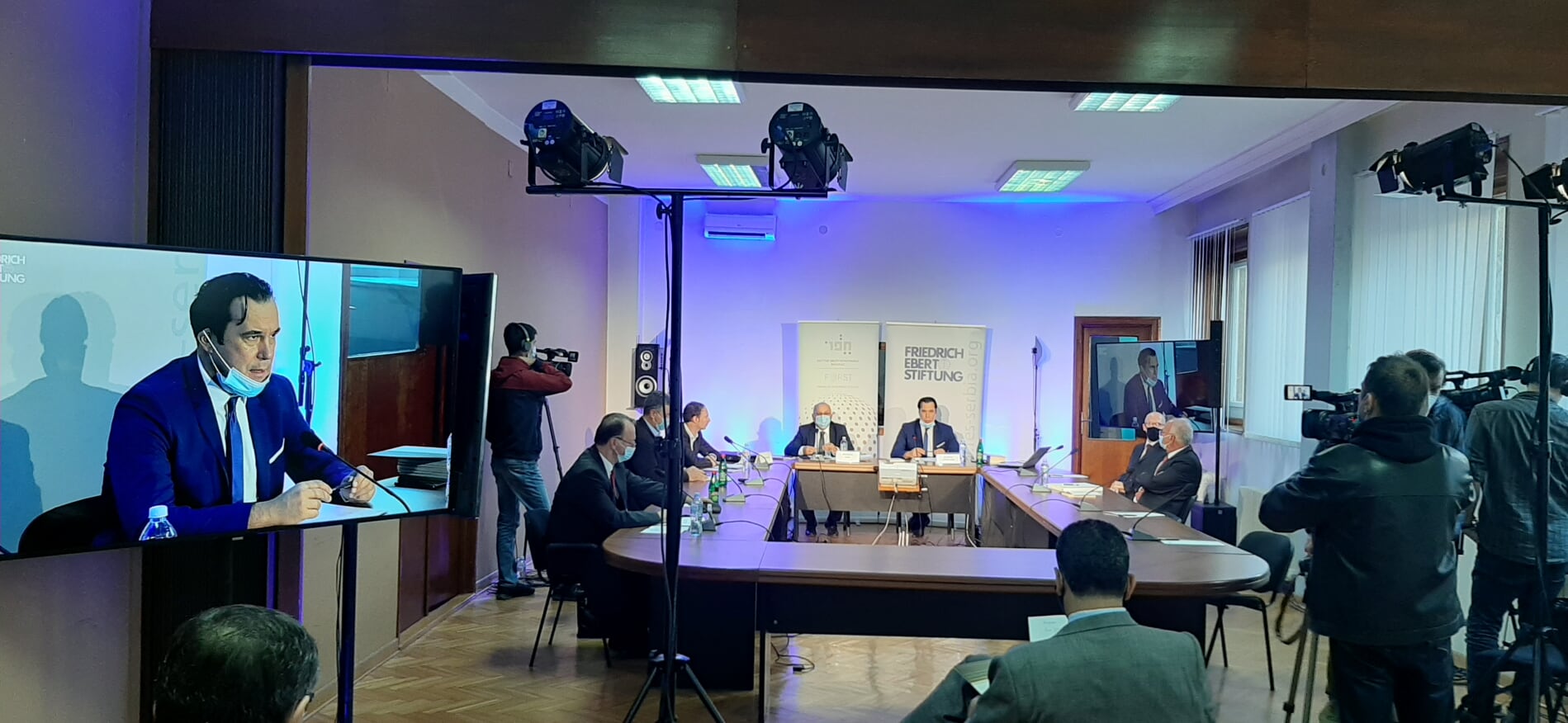Strategic Streams 2020: Geopolitics of Covid-19 and the Consequences of the Pandemic for the World, Europe and the Balkans
International scientific conference Strategic Streams 2020: Geopolitics of Covid-19 and the Consequences of the Pandemic for the World, Europe and the Balkans, organized by the Forum for Strategic Studies (FORST) was held at the Institute of Social Sciences on the 23rd October 2020. bringing together domestic and foreign experts in the field of political science, international relations, geopolitics and strategic studies.
The conference discussed the impact of the Covid-19 pandemic on international relations and wider geopolitical developments through three panels, with live speakers from the conference room or online via the Zoom platform, including participants from Brussels, Paris, Vienna, Lisbon, Bucharest and Podgorica – with efforts to analyze the consequences of the pandemic on strategic streams in the world, Europe and the Balkans.
Dr Steven Blokmans, director of CEPS, a well-known European think tank researching the EU foreign policy, joined the panel from Brussels via the Zoom platform, presenting his assessments of the pandemic’s impact on the global order and global geopolitical trends. Ambassador Dr Duško Lopandić, a well-known diplomat and expert, spoke live about the impact of the pandemic on international relations while Dr Dejan Šoškić, professor at the Faculty of Economics in Belgrade and former governor of the National Bank of Serbia, spoke about the economic consequences of the pandemic at the global level. Dr Ognjen Pribičević, principal research fellow and member of the Forum for Strategic Studies, spoke about the impact of the pandemic on the elections in the USA and about the changes in the international order that will occur after the pandemic.
The second panel Consequences of Pandemic to the Europe – Position of EU in the world of Geopolitical Superpowers, “Geopolitical EU”, EU in the 21st Century was held completely via Zoom platform, with speakers from Brussels, Vienna, Paris and Lisbon. Dr Dušan Reljić from the German Institute for International and Security Affairs joined the conference from Brussels and spoke about the specific position of the European Union during and after the pandemic. After him, a member of the European Parliament, Franz Bogovič, joined the conference from Vienna, talking about the influence that the European Parliament has in resolving the Covid-19 crisis, but also about the EU’s policy towards the Western Balkans region. After them, Dr Emmanuel Dupuy, director of the Institute for European Prospective and Security, joined the conference from Paris, talking about France’s specific role in European politics and how France, as one of the EU’s leaders, views the possible consequences of the pandemic in Europe and how it prepares for them. At the end of the panel, Dr Armando Marquez Guedes, a professor at the University of New Lisbon and former director of the Diplomatic Academy of Portugal, spoke about the impact of the pandemic on relations between the European Union and other major geopolitical powers, such as the United States, China and Russia.
At the end of the third panel, General Blagoje Grahovac, an expert in geopolitics and former Deputy Minister of Defense, spoke about the possible social and strategic consequences of the Covid-19 pandemic, concluding that the pandemic could increase the strength and activity of alternative social movements, emphasizing that they could be the bearers of social change on a global scale.
The final discussion of the conference was held after the third panel, where the conference participants gave their strategic forecasts and predictions of current global strategic trends – from Brexit deal, through the US presidential elections, predicting in general short-term, medium-term and long-term consequences of the Covid-19 pandemic for the world, Europe and the Balkans.
This year, for the second time, the International Scientific Conference Strategic Streams is being held under the aforementioned full title, bringing together experts from the fields of political science, international relations, geopolitics and strategic studies, thus becoming a recognizable annual regional conference which analyzes global, European and regional strategic trends.

